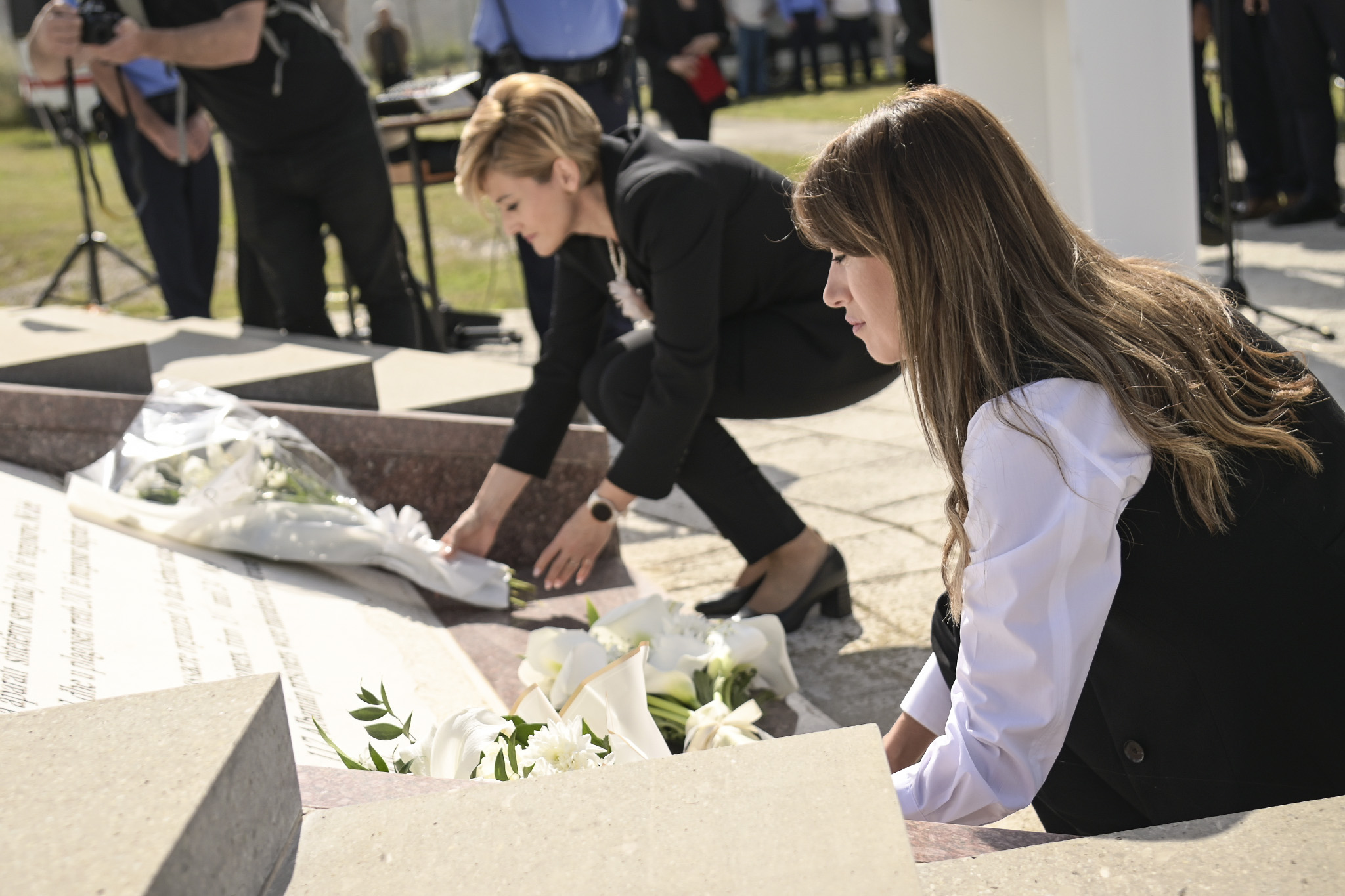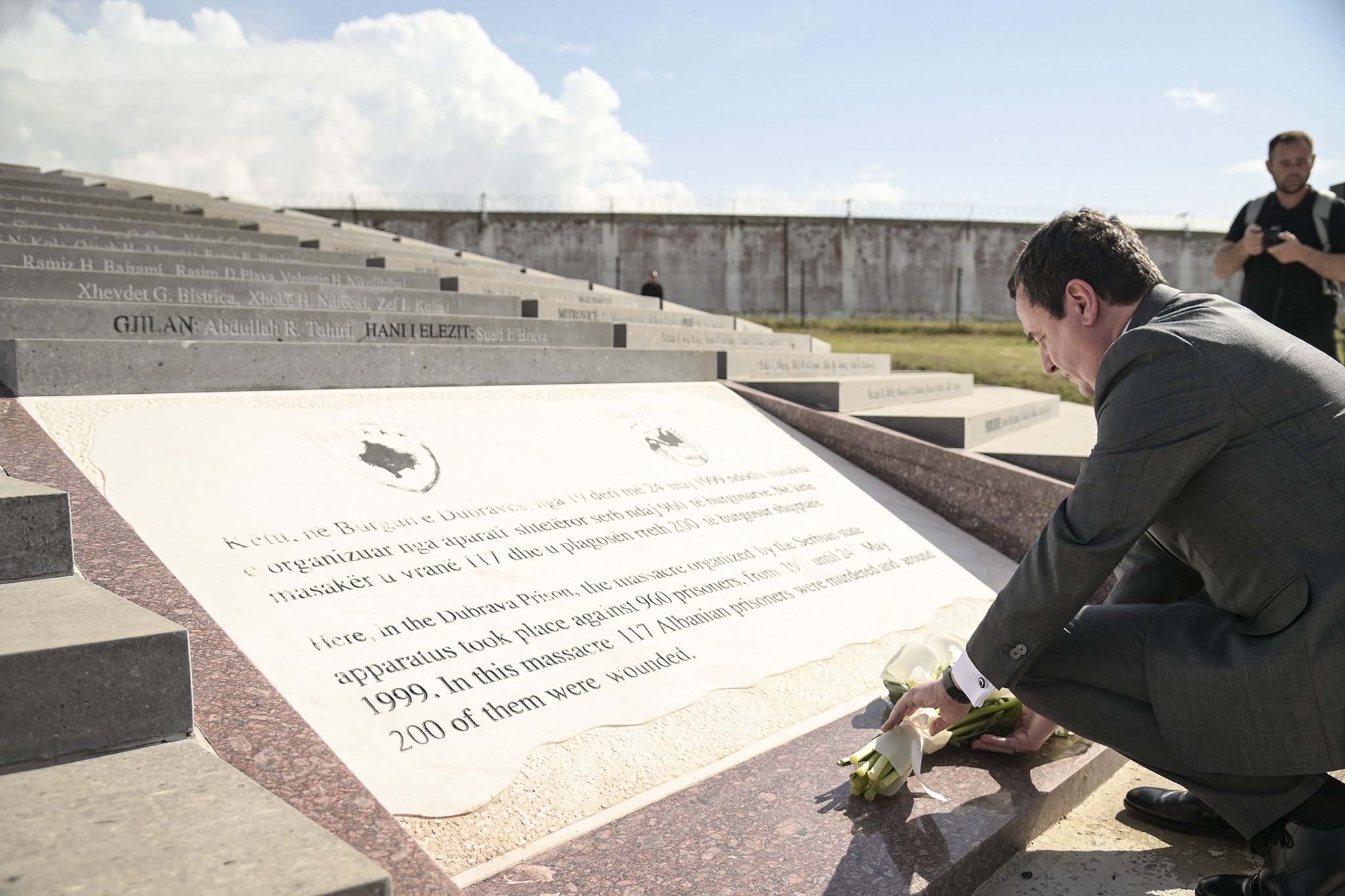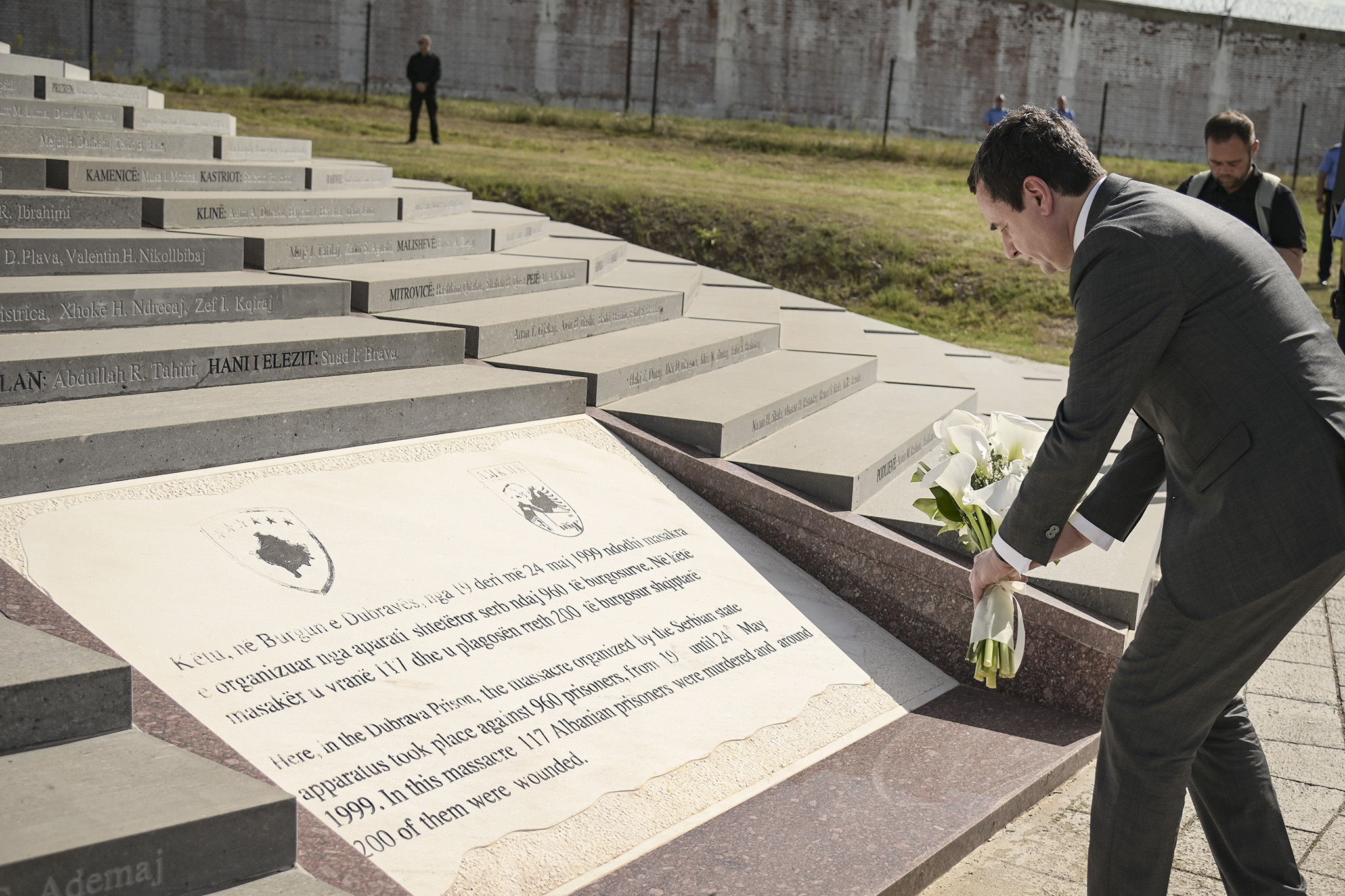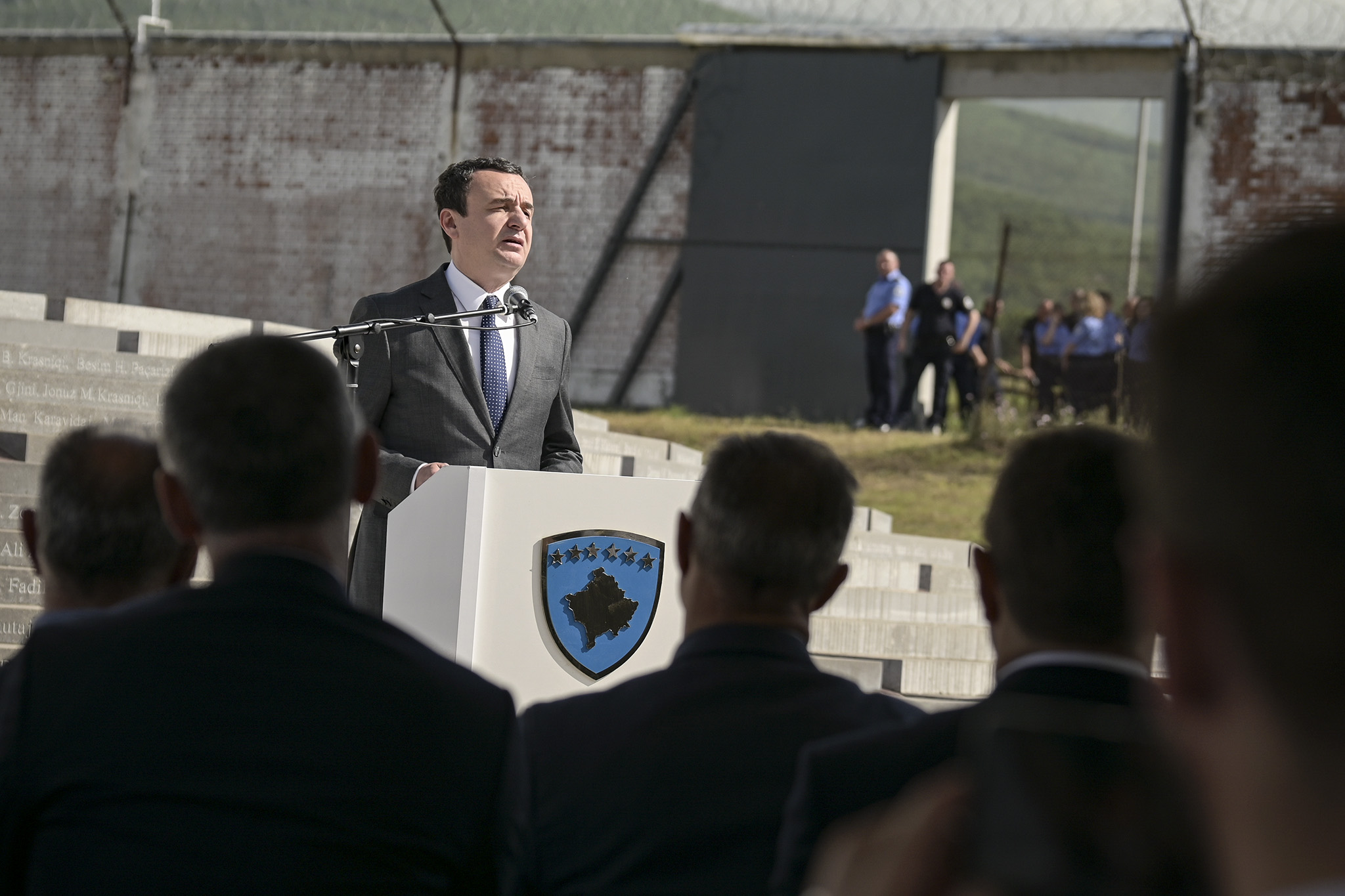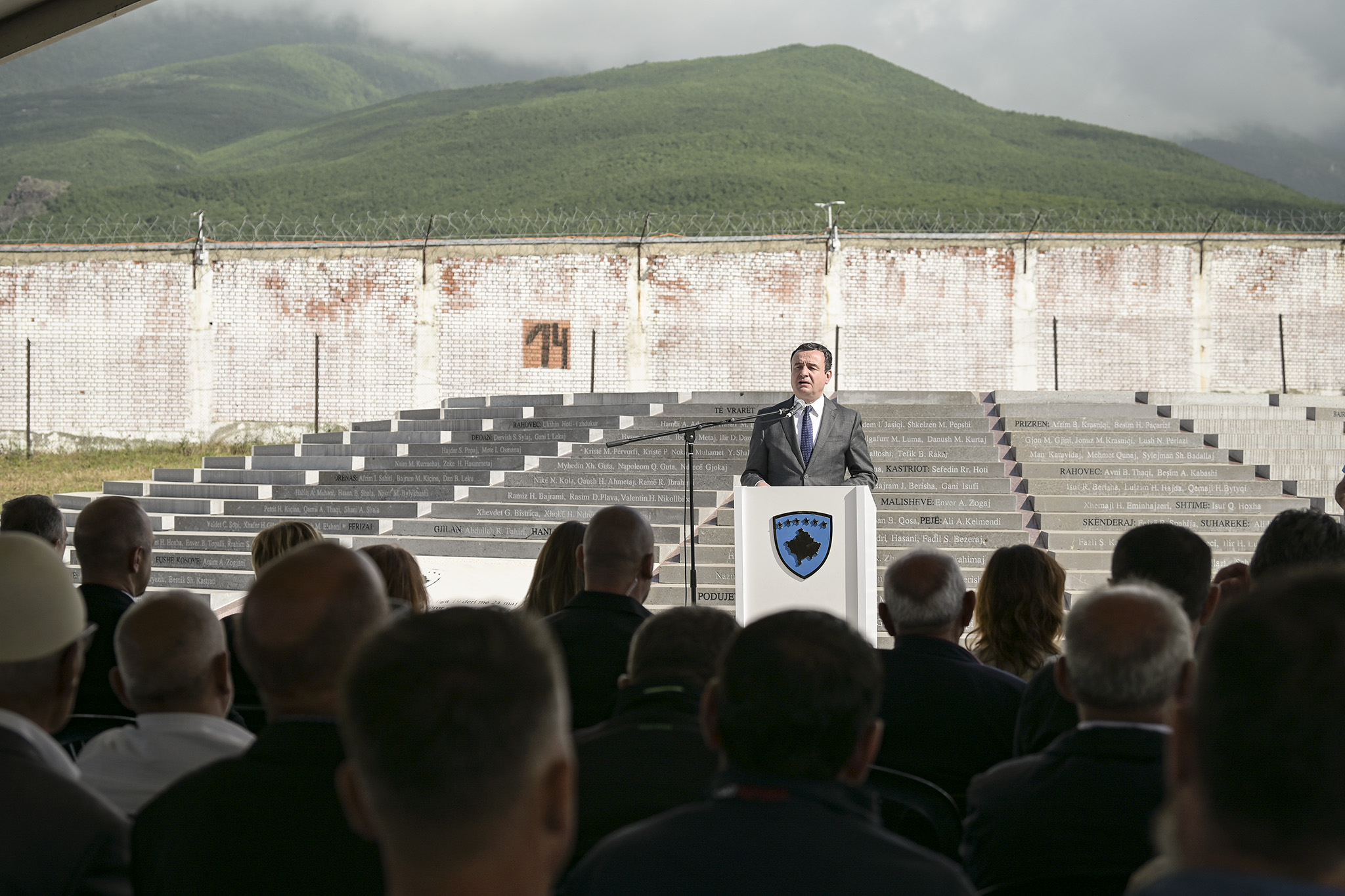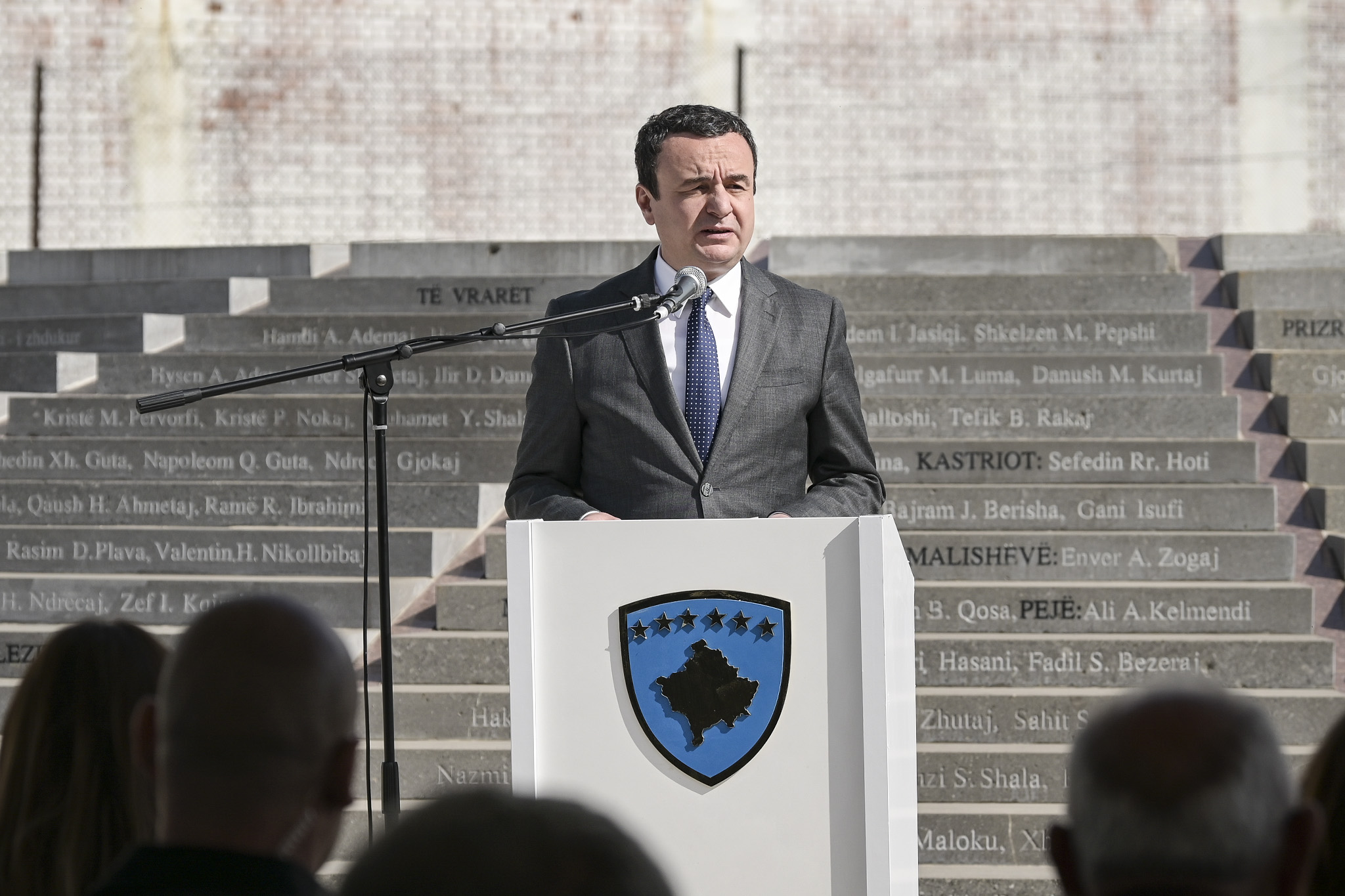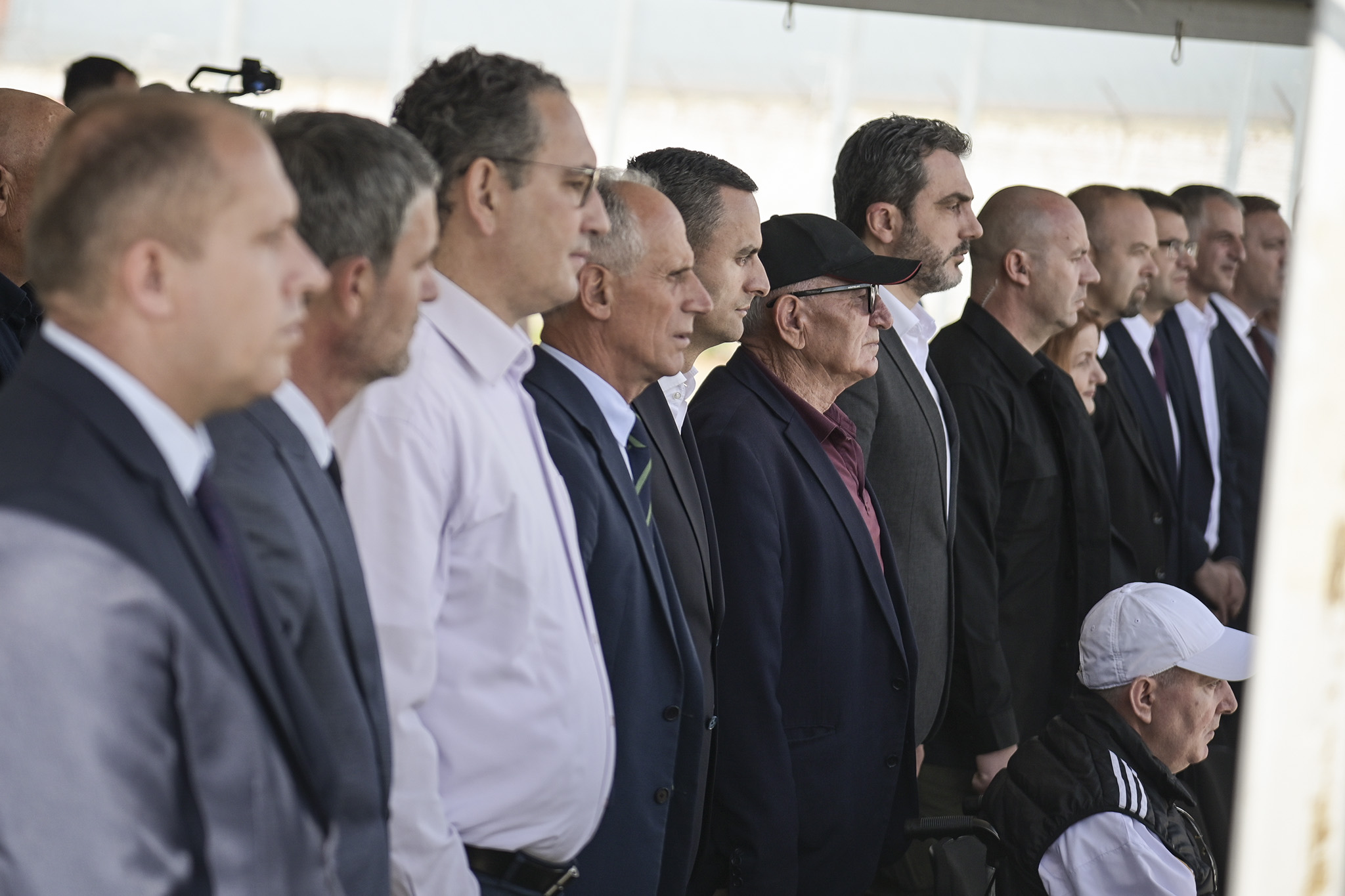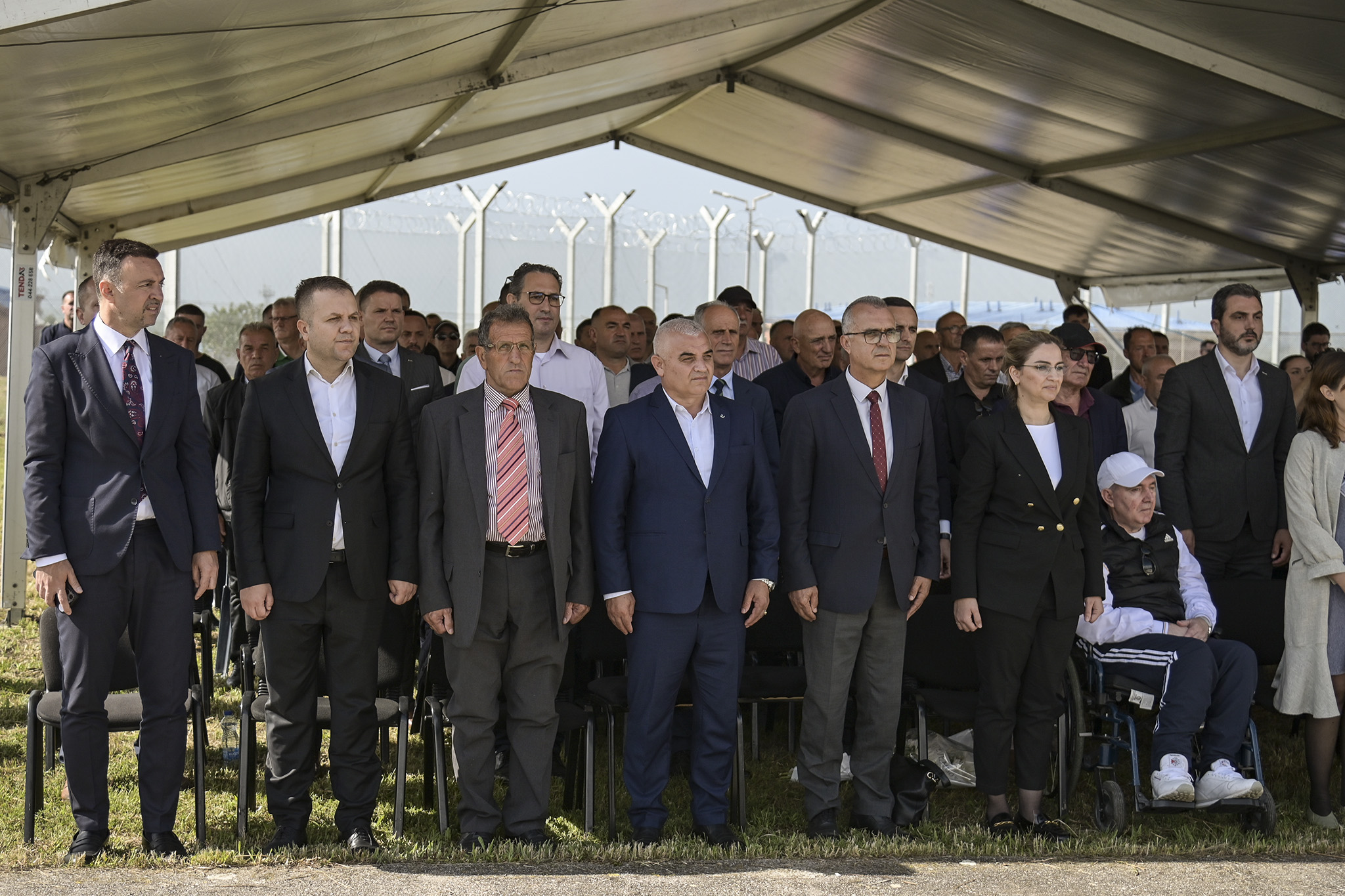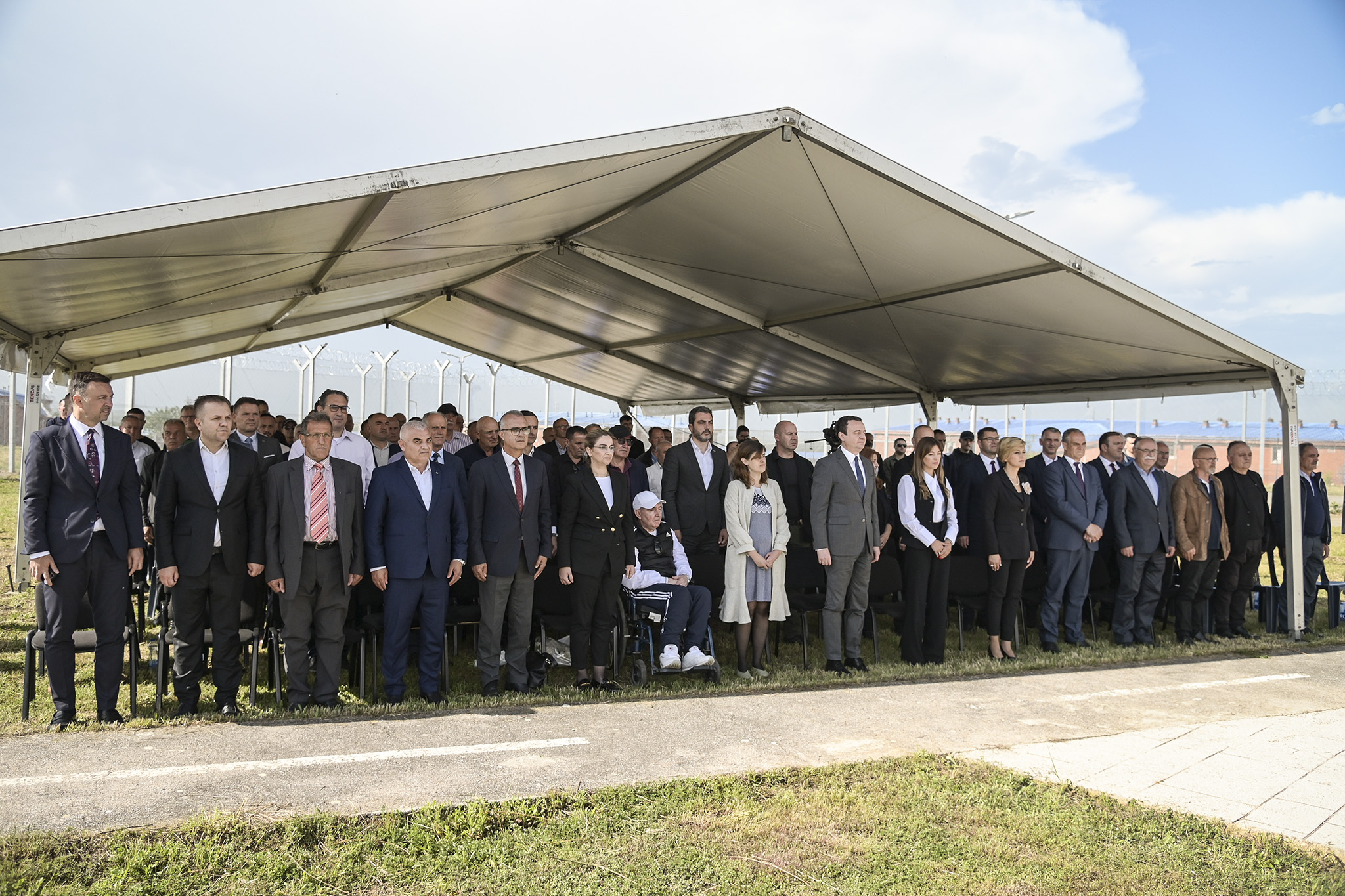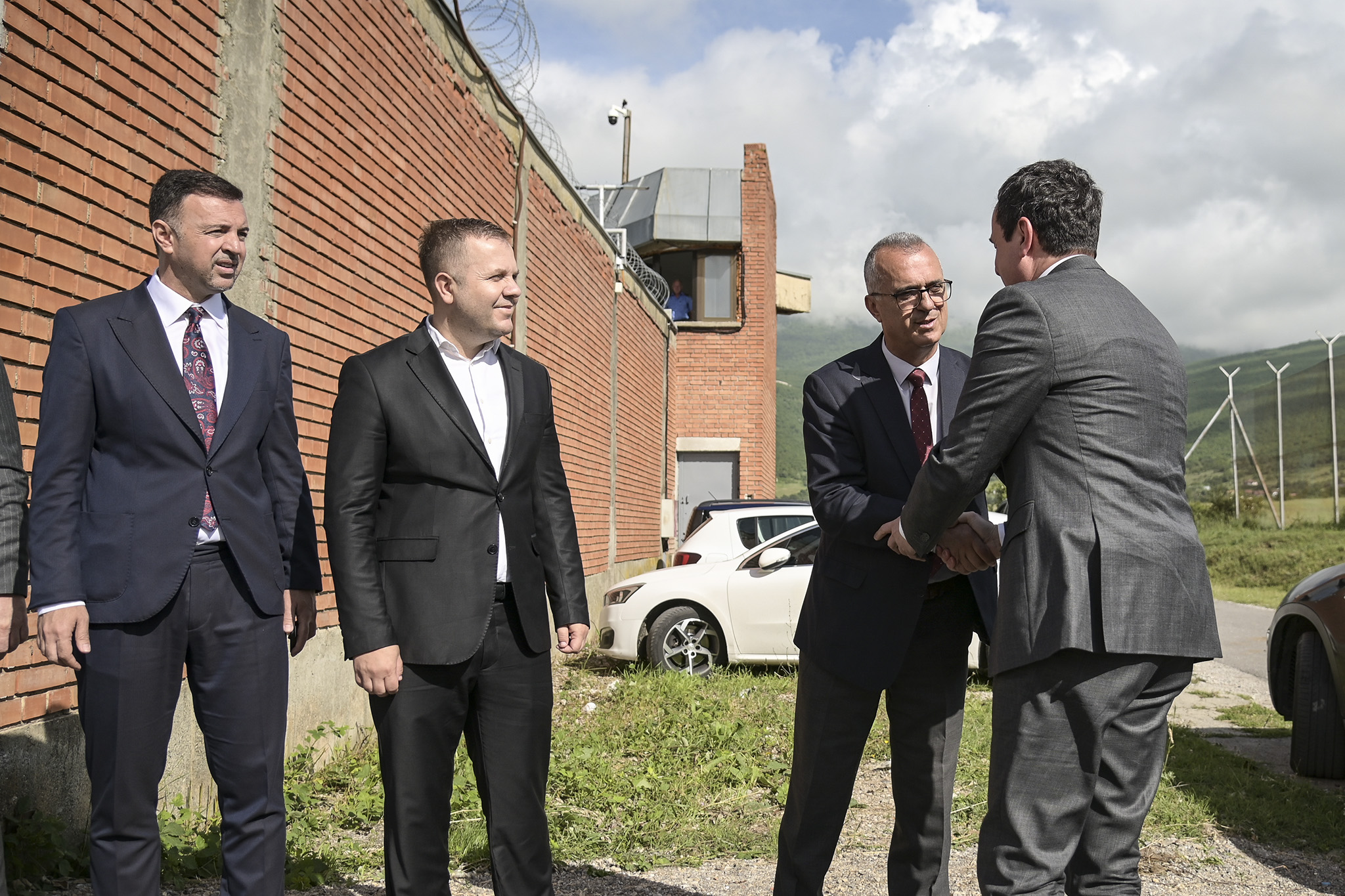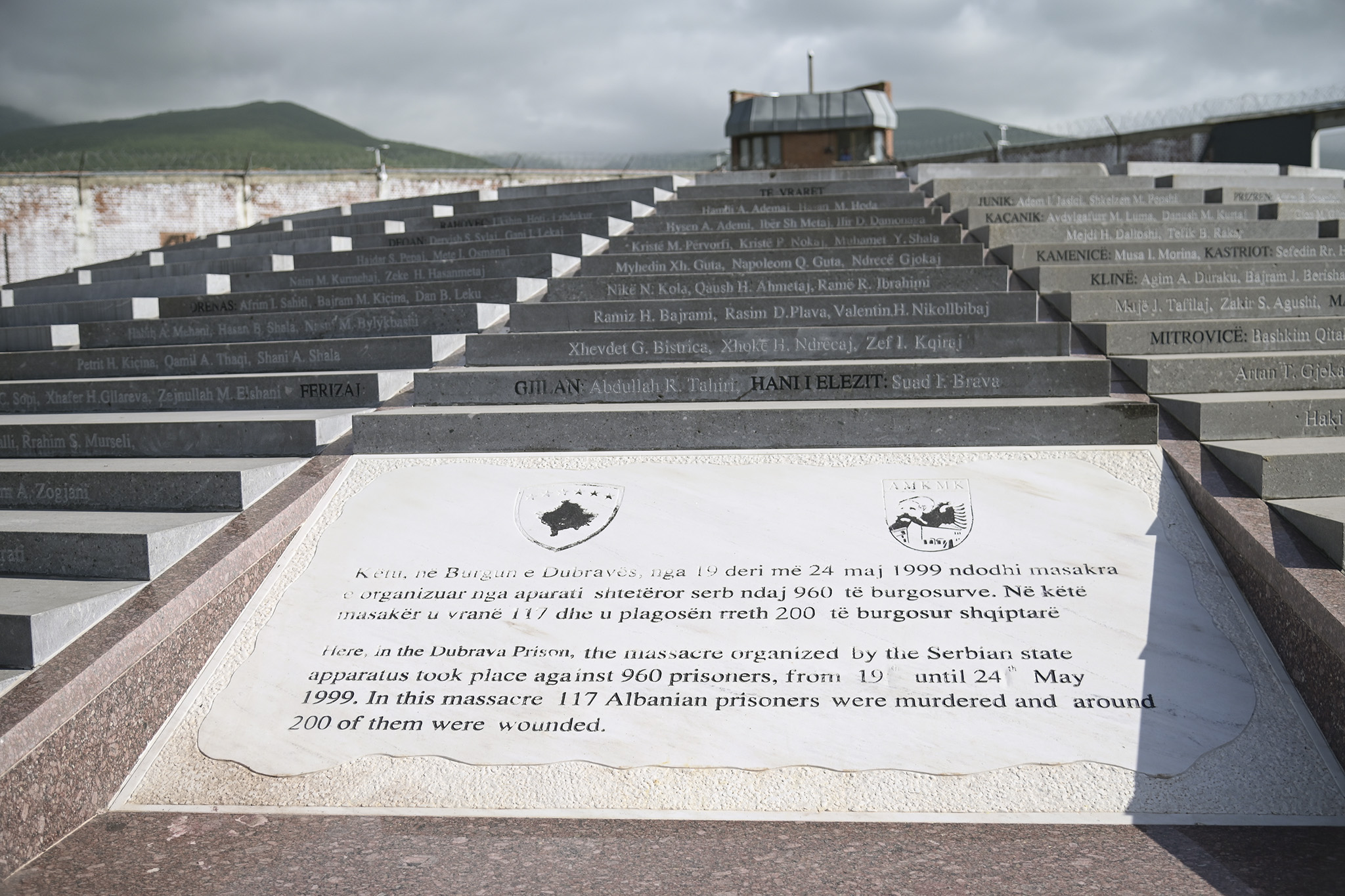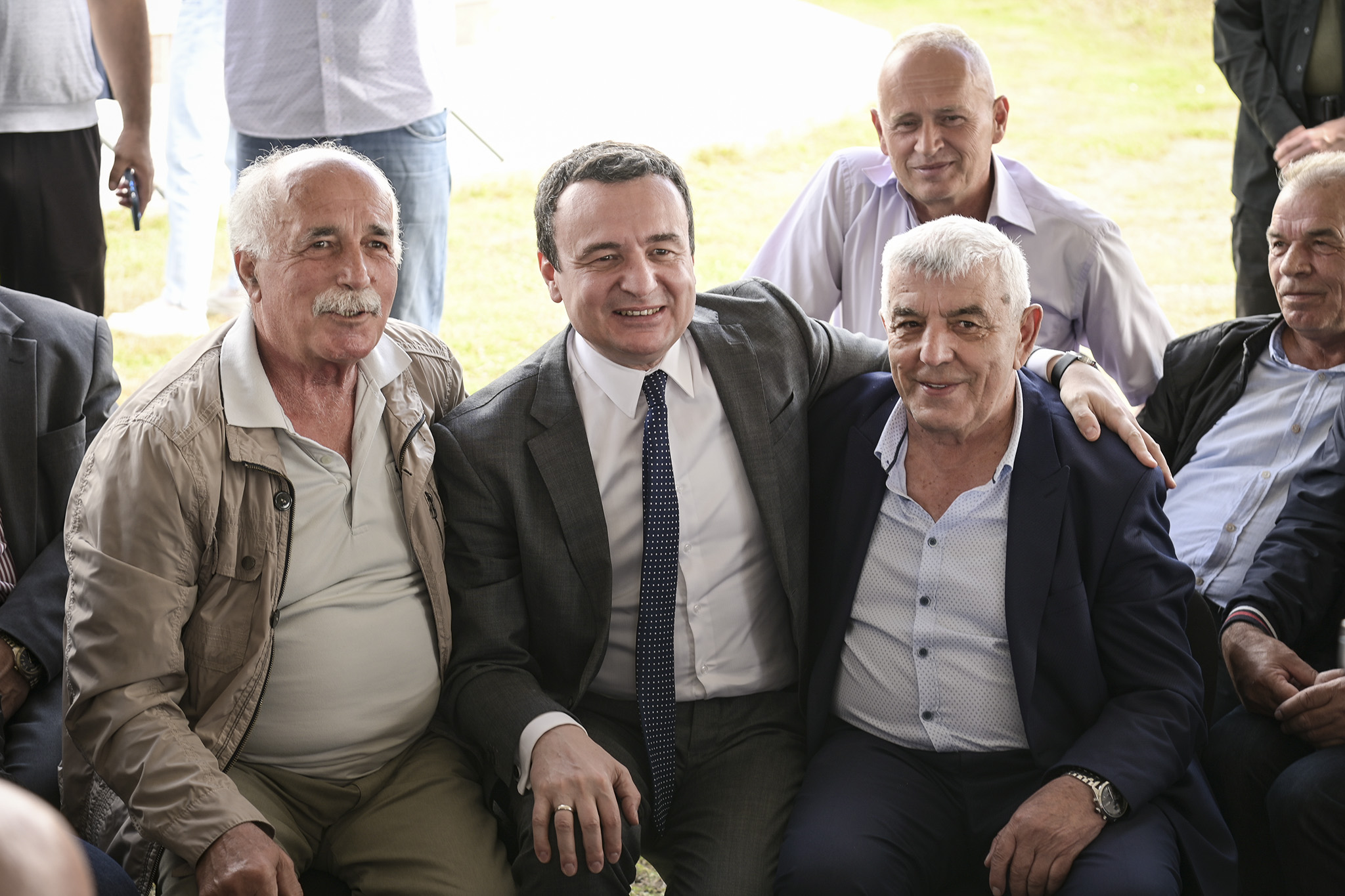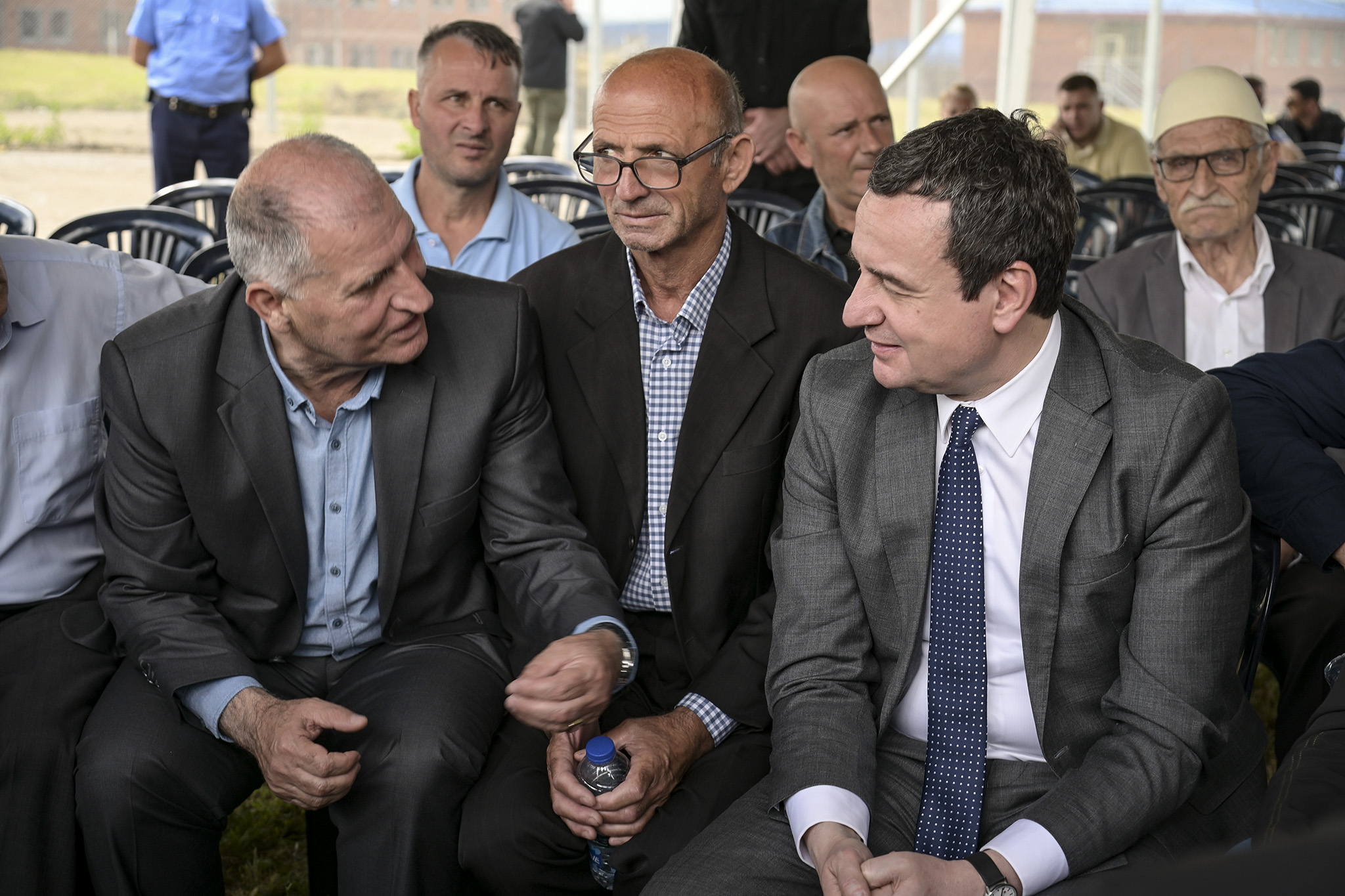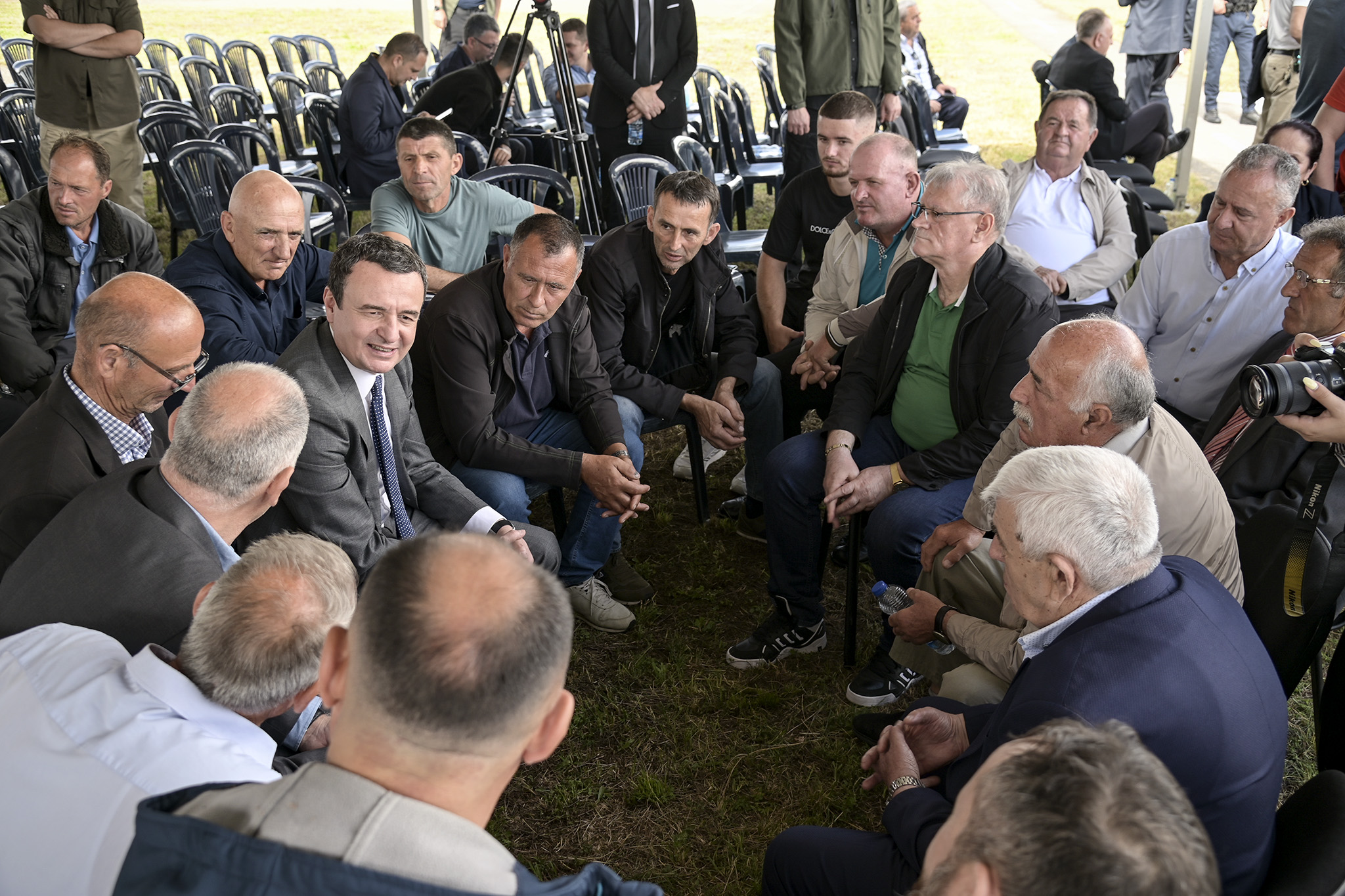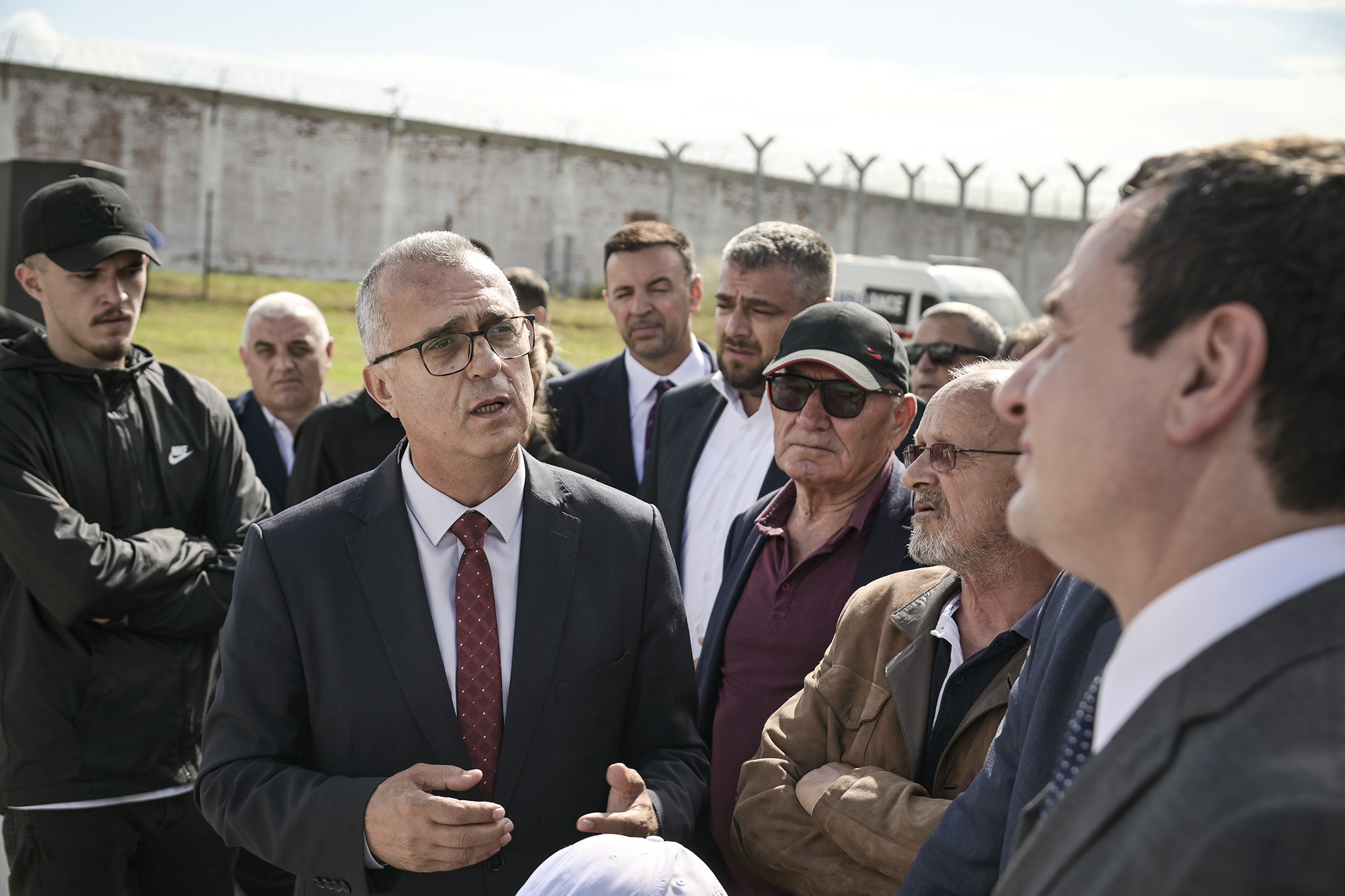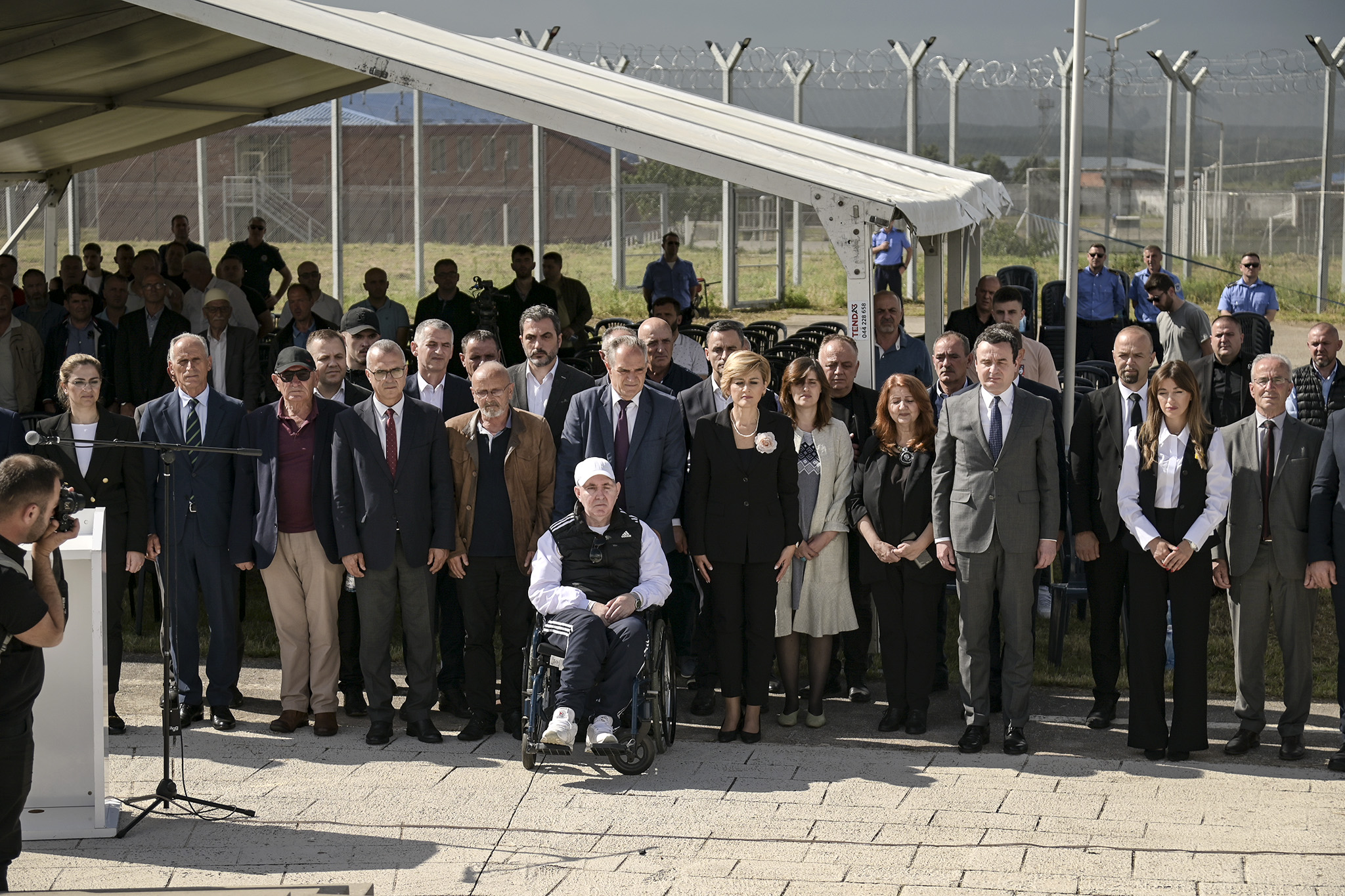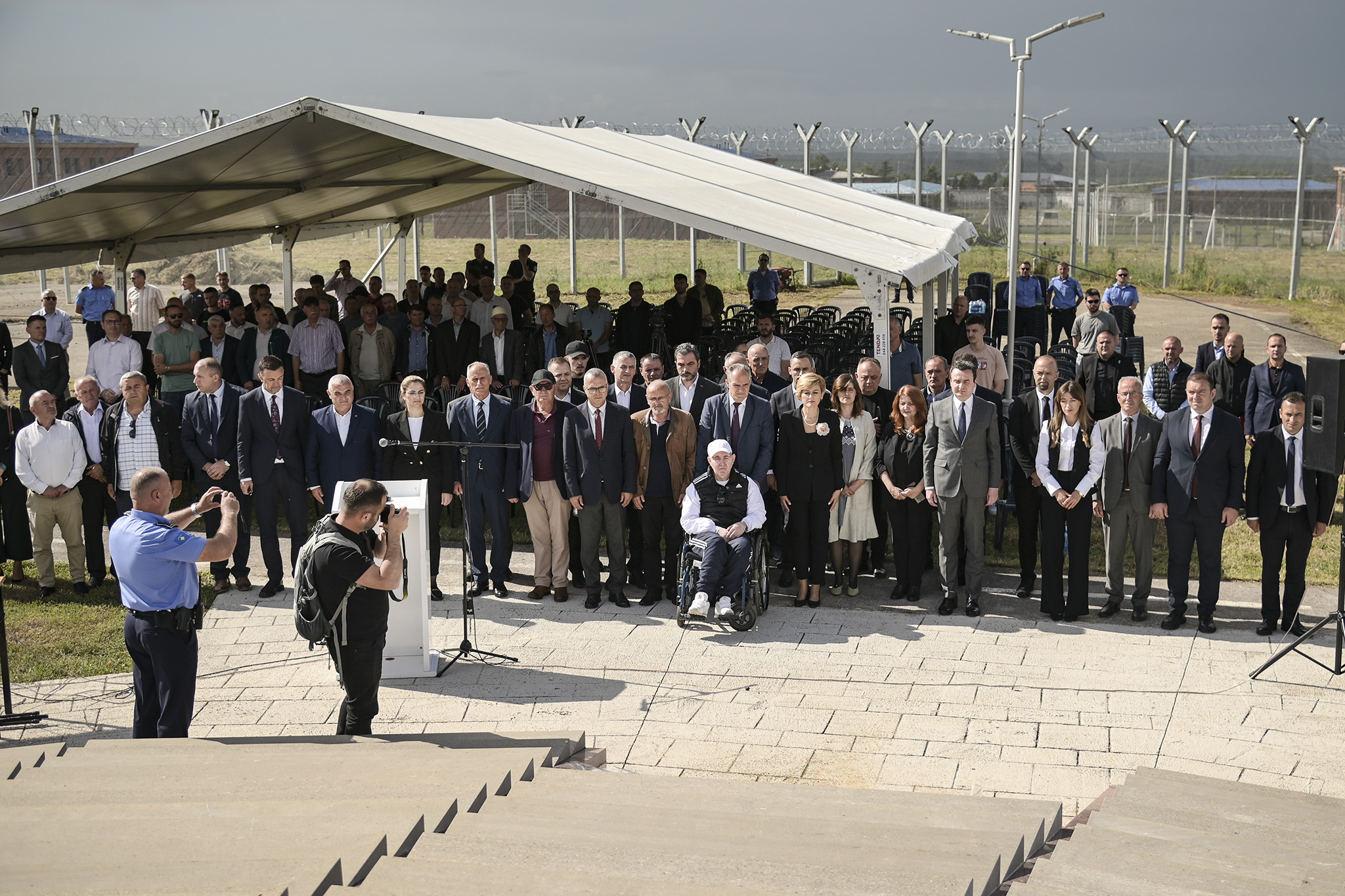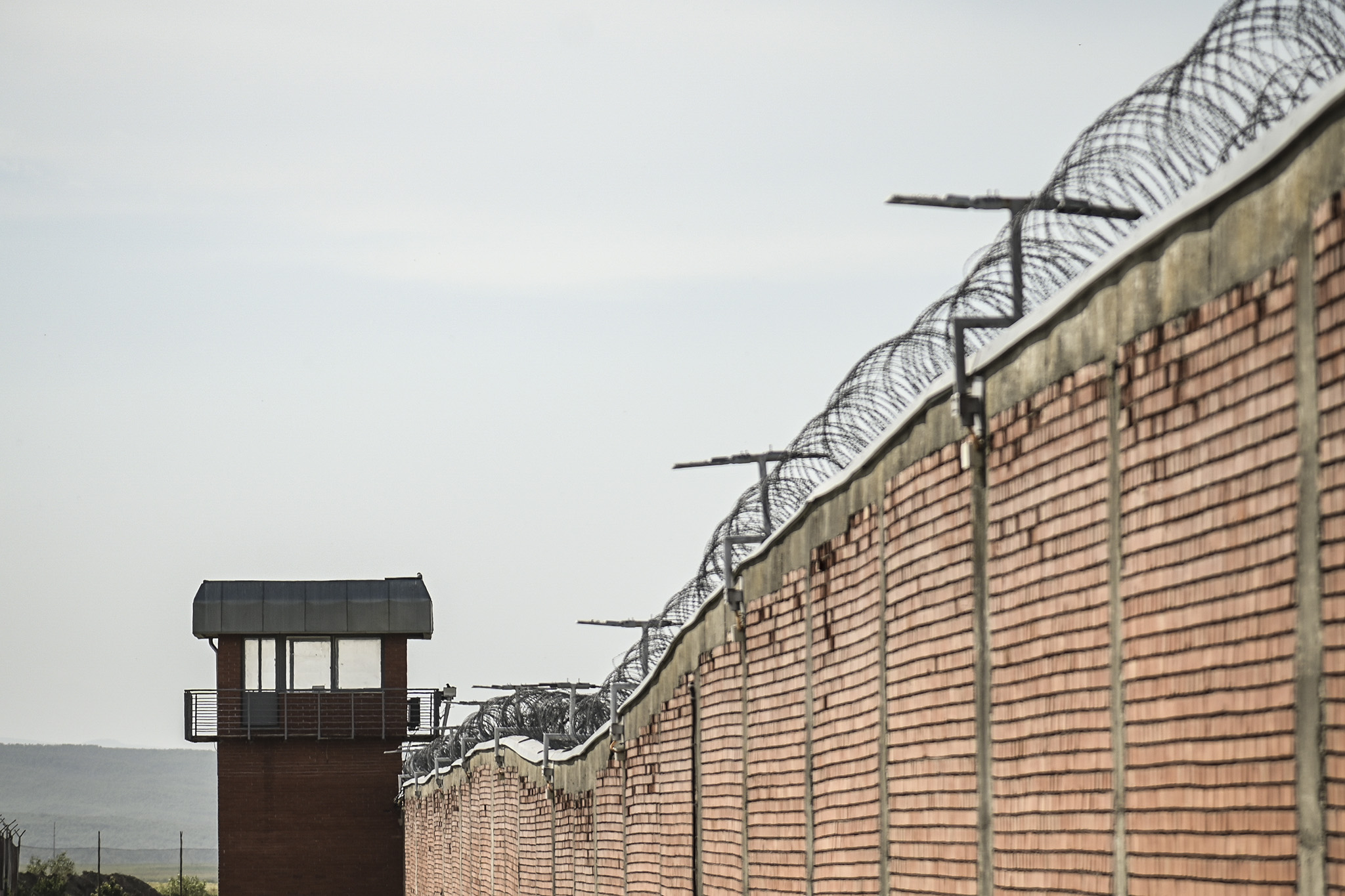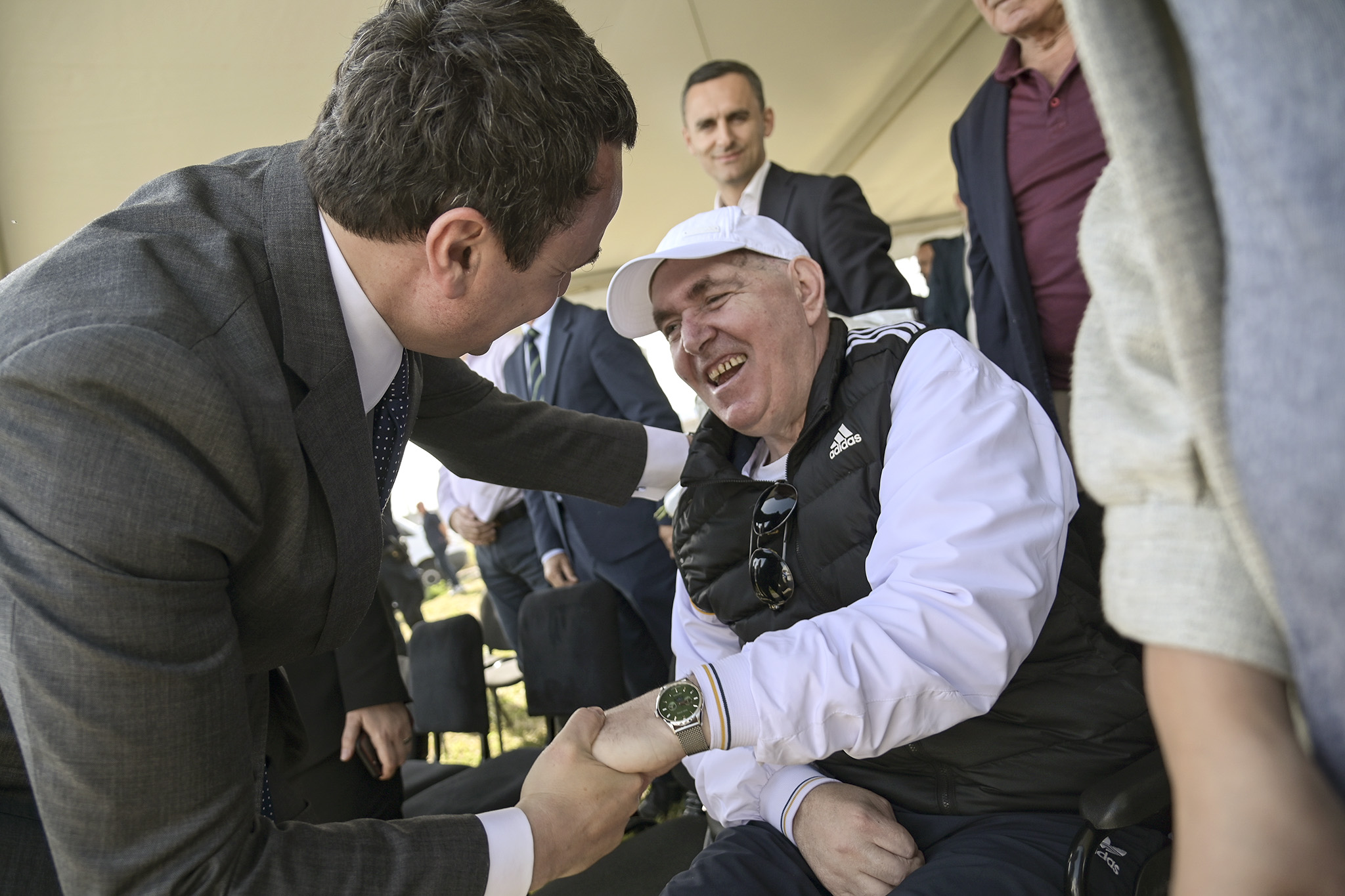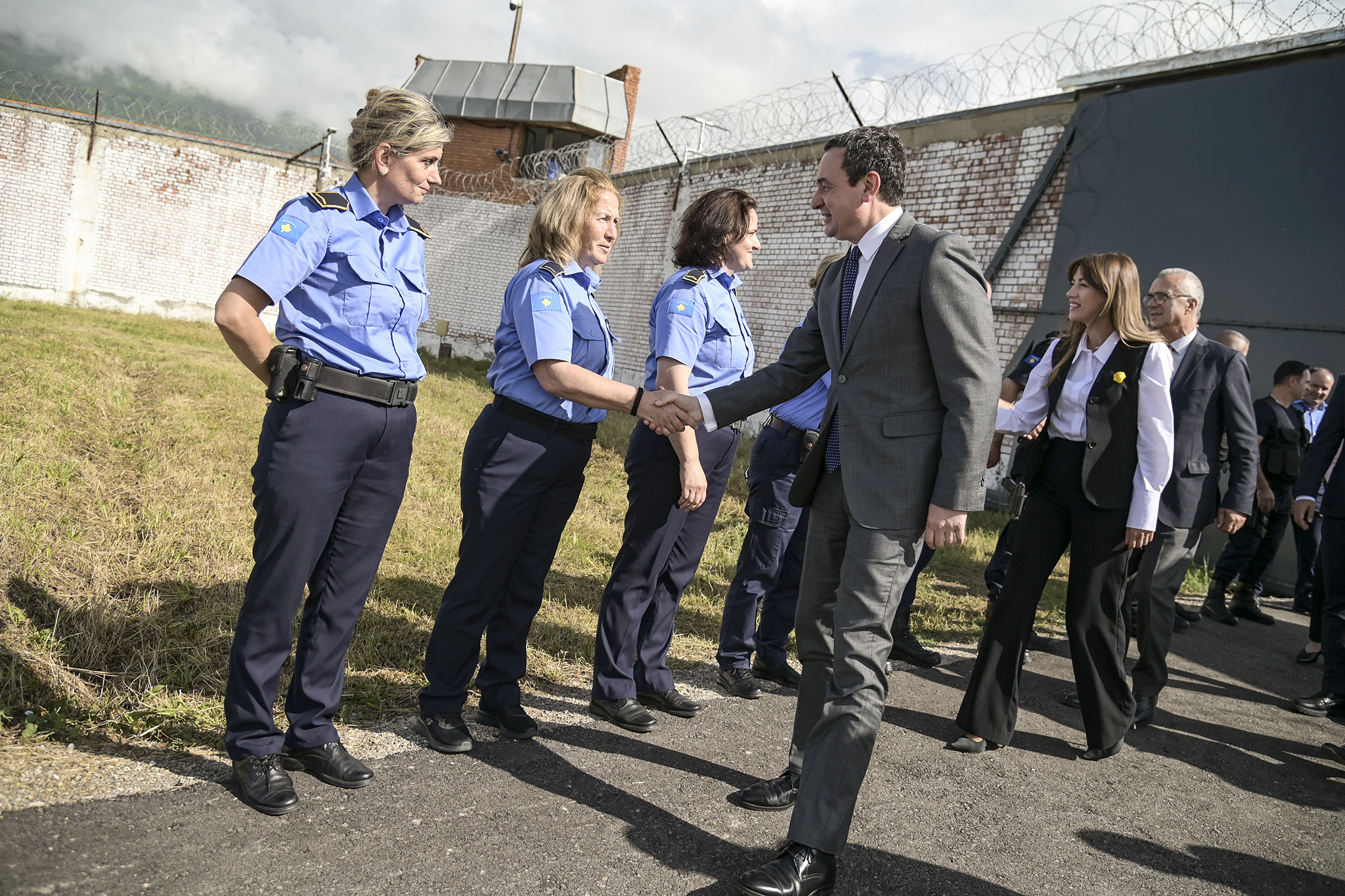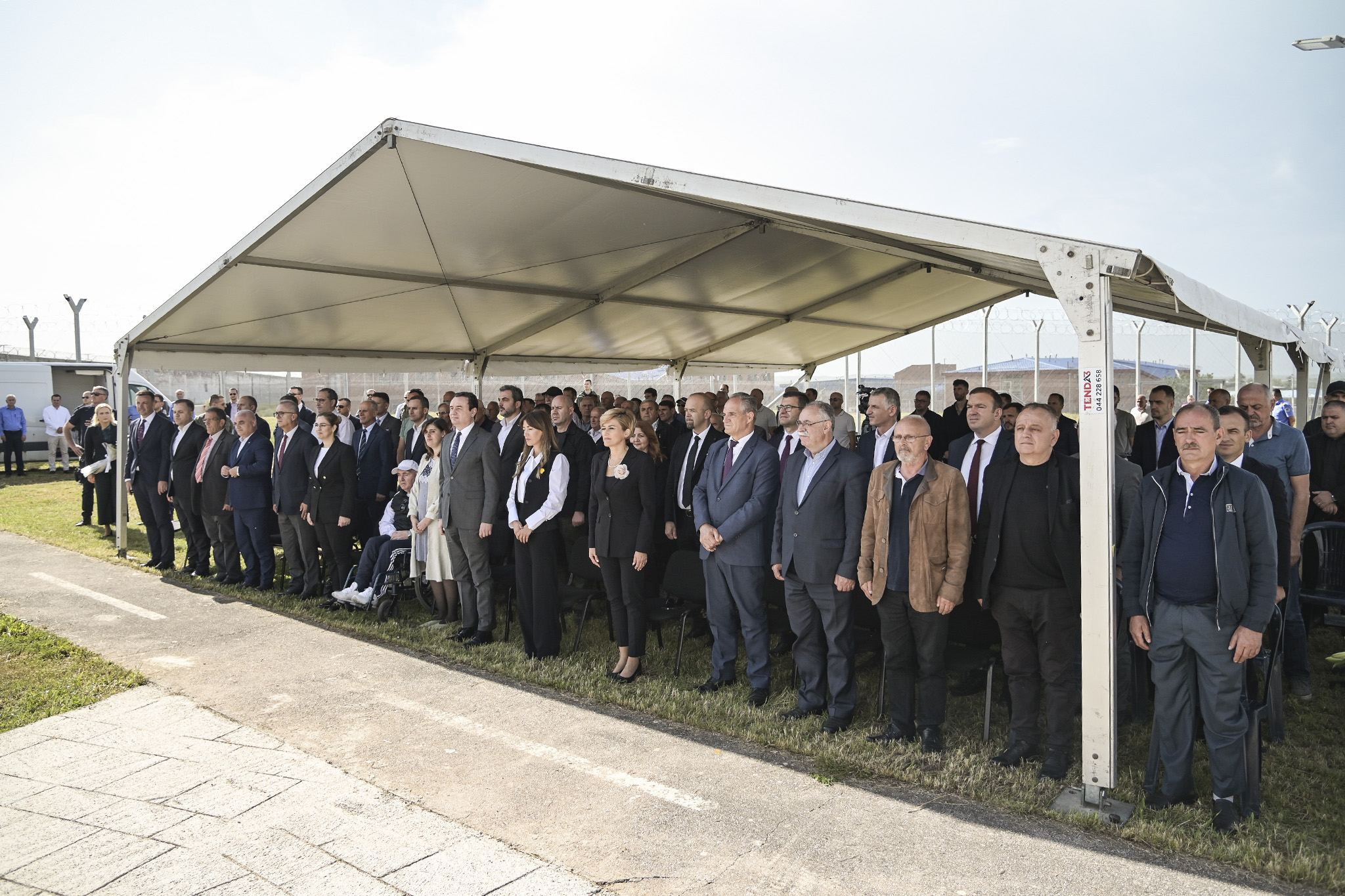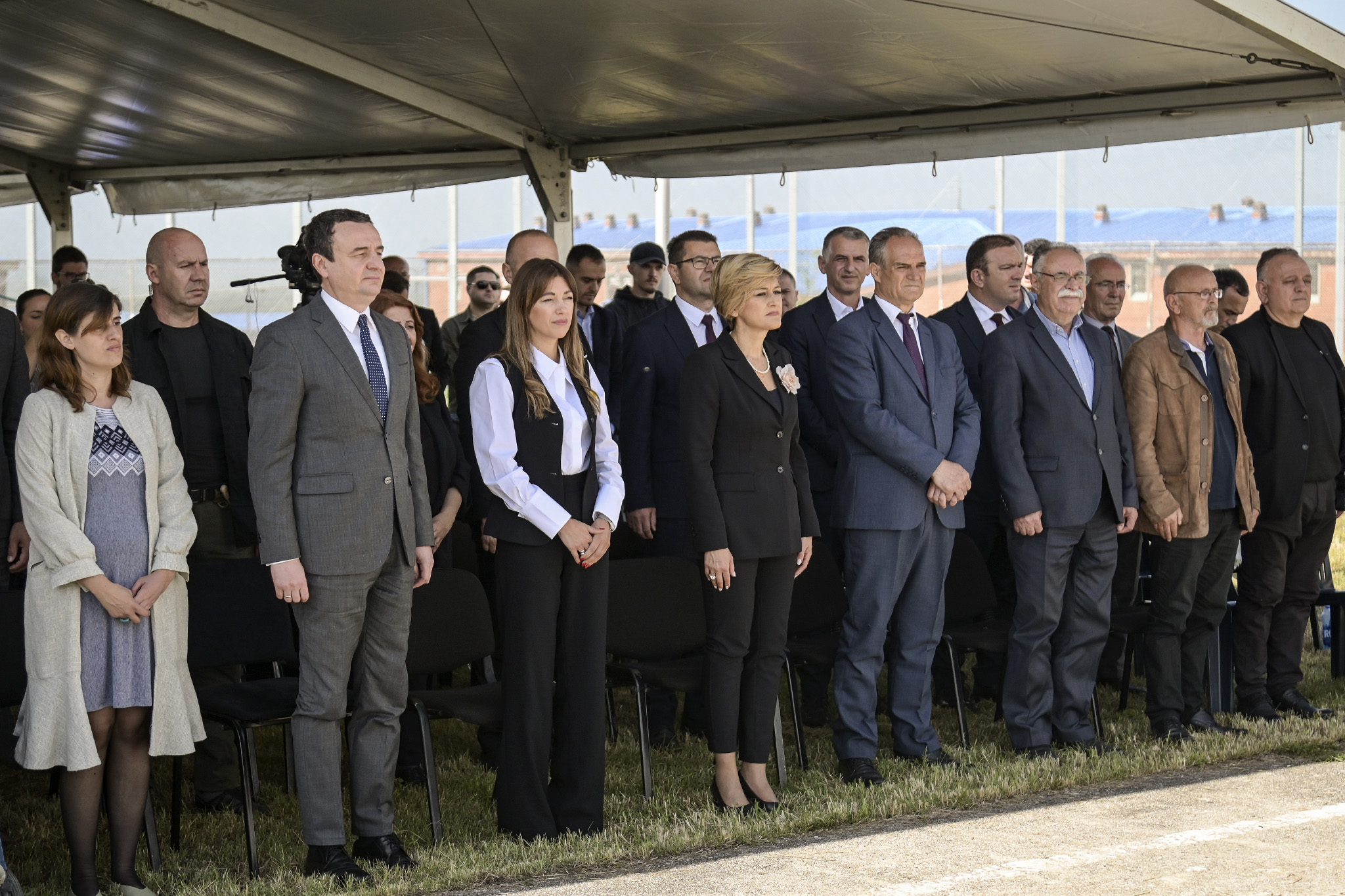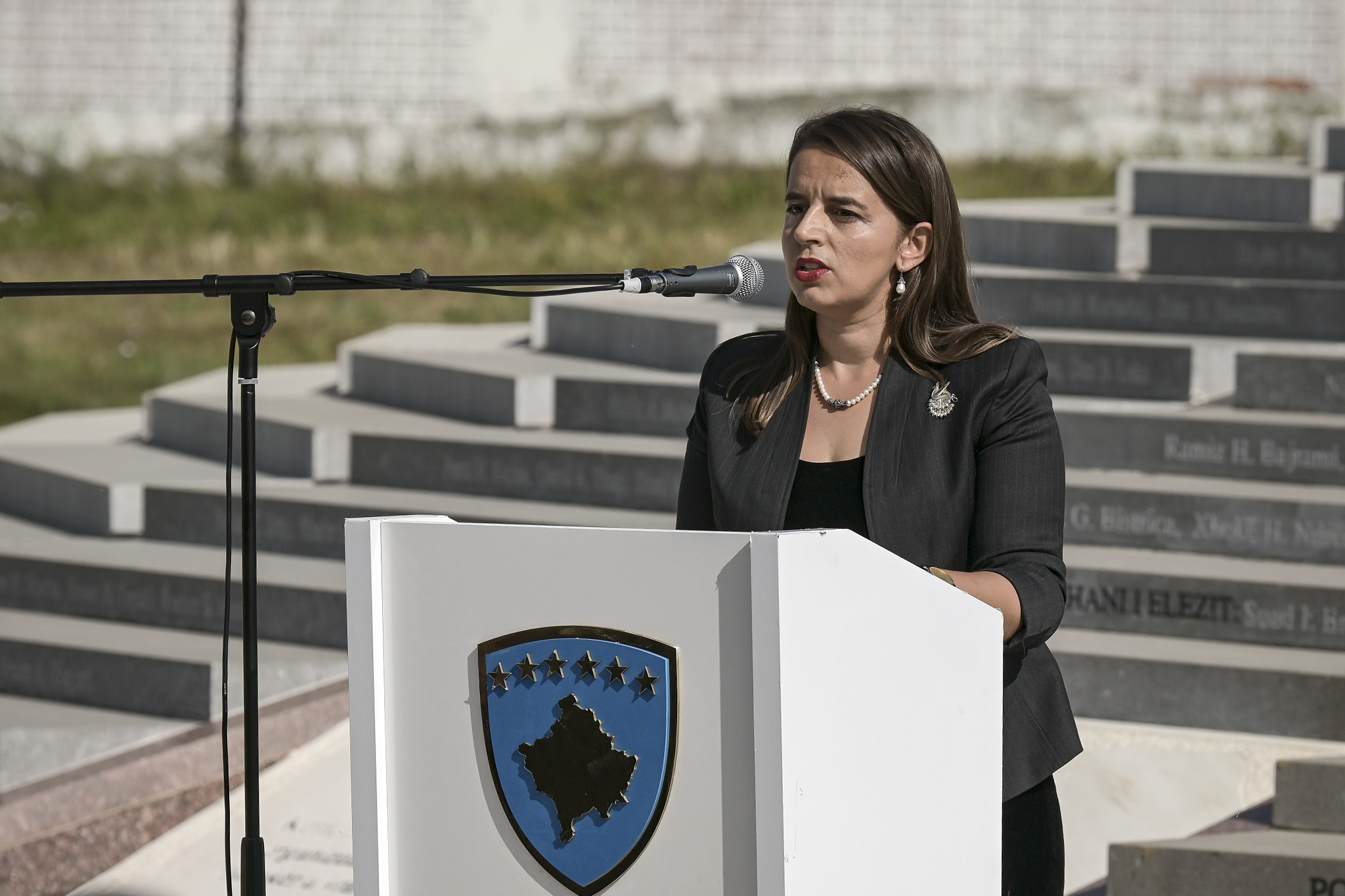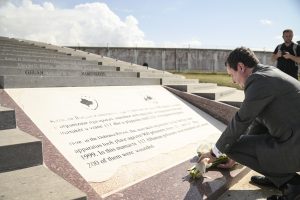Dubrava, Istog, 22 May, 2024
On the 25th anniversary of the massacre in the prison of Dubrava, the Prime Minister of the Republic of Kosovo, Albin Kurti, honored and commemorated with tributes those who were cruelly killed in the massacre of Dubrava, by the Serbian enemy forces.
In the spring of May, from May 19 to 24, 1999, 116 prisoners were killed and massacred and one disappeared, out of 980 who were gathered in Dubrava prison. Of them, 771 survived this massacre, while 185 were injured by the Serbian forces.
Each of the Albanian prisoners who were in the prison of Dubrava in those days of May 1999, is a witness to history and a witness to the truth of Kosovo, said the prime minister, as he emphasized that the names engraved on the memorial of the 116 killed in this massacre, are the truth and the most powerful accusation about the Dubrava massacre.
The Prime Minister emphasized that the missing person in this massacre, who is the politician and political ideologue of our national issue, Professor Ukshin Hoti, is the written and lived truth of the political destiny of Albanians under Serbia. It is the truth of the thousands of violently disappeared from Serbia, of which 1597 are still missing.
Our state, the Republic of Kosovo, will find ways and means to prove again and again, as today, as last year, as we have done during these 25 years, to put justice and the truth so important of history, of the sacrifice and resistance of our people, said the Prime Minister.
Among other things, he also mentioned the three generations that include political prisoners during three decades, during the 50s, 60s, and 70s; the second generation, also called the ’81 Generation, which included political prisoners after the student demonstrations of 1981, as well as the third generation of the 90s, including prisoners during the war. “I myself am a part of this, because together with many of you who are here today and with many others, I was arrested, imprisoned and held as a hostage of war, while I was tried in Nish in a political process by the authority of the regime criminal of Serbia”, added the prime minister.
Present at these tributes, organized by the Office of the Prime Minister of the Republic of Kosovo, in cooperation with the Organizational Council of former political prisoners of Dubrava Prison, were Saranda Bogujevci, Deputy Speaker of the Assembly of the Republic of Kosovo, Albulena Haxhiu, Minister of Justice, Enver Dugolli, deputy in the Assembly of the Republic of Kosovo, Nait Hasani, former political prisoner, Andin Hoti, chairman of the Government Commission for missing persons, members of the Assembly, members of the government cabinet, family members of the killed, martyrs and survivors of Dubrava massacre.
Prime Minister Kurti’s complete speech:
Dear, Mrs. Saranda Bogujevci, Deputy Speaker of the Assembly of the Republic of Kosovo
Dear, Mrs. Albulena Haxhiu, Minister of Justice
Dear Enver Dugolli, deputy in the Assembly of the Republic of Kosovo,
Dear Nait Hasani, former political prisoner, former MP and ambassador,
Dear members of the Assembly of the Republic,
Dear Deputy Ministers,
Dear former political prisoners,
Dear family members of the killed, martyrs and survivors of the Dubrava massacre,
Dear attendees,
Ladies and gentleman,
Sisters and brothers,
In three weeks, it will be a quarter of a century from the middle of June 1999, when Kosovo was liberated from occupying, conquering Serbia, after a long resistance and a liberation war with thousands of victims and martyrs. Today it was 25 years since the massacre that took place here, in Dubrava prison. From May 19 to 24, 1999, out of about 980 Albanian prisoners who were gathered here, 116 prisoners were killed and one disappeared. 771 prisoners survived, of which 185 were wounded.
Each of the Albanian prisoners who were here in the prison of Dubrava in those days of May 1999, is a witness to history and a witness to the truth of Kosovo. And this truth in itself is an indictment before justice and history, towards the state of Serbia, for the responsibilities it has for its criminal past in Kosovo. The 116 killed whose names are engraved here on this memorial are the truth and the most powerful accusation about the Dubrava massacre. The missing person in this massacre, who is the politician and political ideologue of our national issue, Professor Ukshin Hoti, is the written and lived truth of the political destiny of Albanians under Serbia. It is the truth of the thousands of violently disappeared from Serbia, of which 1597 are still missing. 185 wounded prisoners out of 771 survivors in total, are the truth among living people who witnessed the massacre of Dubrava, the truth that still speaks and testifies, like here today.
During these 25 years, we have read the history and scenarios of the Dubrava massacre in books, heard them in interviews and in private conversations, from hundreds of prisoners who escaped. We have read and heard them from Asllan Selimi, from Enver Dugolli, from the Gjakova group with 143 prisoners, from Nait Hasani, from Selim Lokaj, from Liburn Aliu, from Bajrush Xhemajli, from Hajredin Hyseni, from Raif Qela, Bislim Zogaj , Gjergj Karaqi, Isak Shabani, Riza Mehmeti, Naser Shporta, Istref Hasani, from Avni Klinaku, from Avdi Mehmeti, from the survivor Rasim Selmanaj, from Avdyl Jetishi, Frashër Shabani, Blerim Camaj, Sadik Zeqiri, Filip Pjetri, from Besim Zymberi, Ismet Mahmuti, Enver Berisha, Demë Batusha, Shaban Beka, from Bilbil Duraku and many, many other survivors. All these survivors, with their testimonies, are potential witnesses in a fair and necessary judicial process, with evidence and proven indictments against those who ordered and carried out the massacre of Dubrava.
During the 20th century, Kosovo was invaded and re-occupied several times by Serbia: first in 1912-1913 during the First Balkan War, then in 1918 at the end of the First World War, then in 1944-45 at the end of the World War World War II and in a more specific form again in 1989, when the autonomy we had was suppressed.
Involved against their political will under Serbia and under Yugoslavia, Kosovo Albanians were the most politically oppressed, economically exploited, discriminated and underrepresented ethnic community in Europe after World War II. In our long road during that half-century period until 1999, filled with so many political activists and illegal organizations, with demonstrations and battles, we, the Kosovar Albanians, have had three whole generations of political prisoners.
The first generation, also called the ’68 generation, included political prisoners of three decades: during the 50s, 60s and 70s; the second generation, also called the ’81 Generation, included political prisoners after the student demonstrations that became popular in 1981; while the third generation is that of the 90s, including prisoners during the war, where we find prisoners from the two previous generations of political prisoners. I myself am a part of this, because together with many of you who are here today and many others, I was arrested, imprisoned and held as a hostage of war, while I was tried in Nis in a political process by the authority of the criminal regime of Serbia.
In the second half of the 20th century, Albanians spent a total of over 666 centuries imprisoned throughout the casemates of Yugoslavia.
In May 1999 Serbia gathered the prisoners in Dubrava in Istog for a crime scene already prepared.
Today, as we commemorate the Dubrava massacre on its 25th anniversary, I speak before you as the Prime Minister of the Republic of Kosovo and as one of you. We are thousands of political prisoners and hostages taken as prisoners of war by Milosevic’s Serbia, whose successors and political heirs continue their anti-Albanian and anti-Kosovo policies in Belgrade, against good neighborliness and peace in the region.
We first heard about the Dubrava massacre in Lipjan prison, where I stayed from May 2 to June 10, 1999, together with survivors of this massacre. Then we heard confessions from other witnesses in the prisons of Pozharevci and Nish, during 1999 until 2001.
Our state, the Republic of Kosovo, will find ways and means to prove again and again, as today, as last year, as we have done during these 25 years, to put justice and the truth so important of history, sacrifice and resistance of our people. Today and in the weather, for every weather, as long as we are alive and between generations forever!
Glory to those who fell in the Dubrava massacre and all those who fell in Kosovo’s long and difficult road to freedom!
Thank you!

